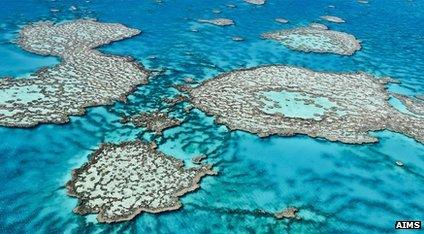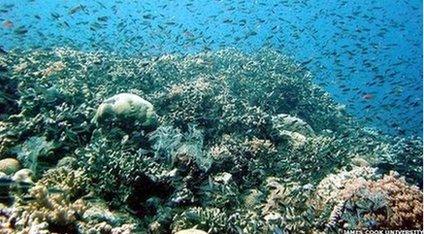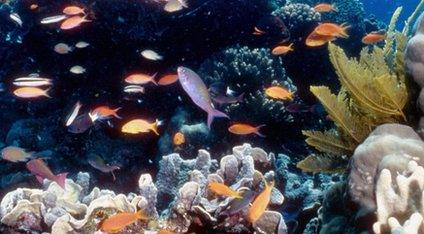Is it possible to protect the Great Barrier Reef?
- Published
Weighing up Australia's dilemma over the Great Barrier Reef
Scientists says the condition of Australia's Great Barrier reef is getting worse and some of the corals are degrading.
It's one of the seven natural wonders of the world and the only living thing on earth visible from space.
Scientists says an Australian government plan to protect the Reef in the future won't work.
They say it doesn't look at the damage caused by climate change, poor water quality and fishing.
Coral reef scientist Professor Terry Hughes talks about protecting the Great Barrier Reef
Professor Terry Hughes, from the Australian Academy of Science, says it also doesn't take into account expansion of coal ports along the Queensland coast.
They want much better action to maintain the reef as it is now and also protect it in the future.

An aerial view of the Great Barrier Reef off the coast of Australia.
Facts about the Great Barrier Reef
It's about 2,500 km (1,553 miles) long on the eastern Queensland coast. It covers an area the size of Great Britain, Switzerland and the Netherlands together.
It's made up of a network of 3,000 individual reef systems, islands, islets and sandbars.
It's home to more than 1,500 different species of fish, 400 species of coral, 4,000 species of mollusc and hundreds of bird species.
It's a Unesco World Heritage site, which means it an important natural environment that should be protected for people to see in the future.
The public have been putting forward ideas on how to protect and manage the reef from 2015 to 2050.

The Great Barrier Reef is the world's largest coral structure and home to rich marine life

A colourful scene on the Great Barrier Reef off Australia's northeastern coast
A plan drawn up as a result, will be studied by the World Heritage Centre in January.
Today, the Australian Environment Minister Greg Hunt said : "We have a clear plan and a strong commitment to ensure the reef is healthy and resilient.''
"Water quality in the World Heritage area is improving as farmers and governments stop using fertilisers, chemicals and reduce sediments running off farming land into the rivers and creeks along the Queensland coast."
